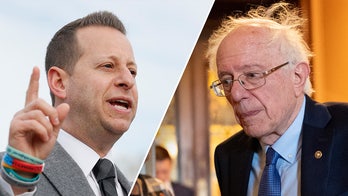Florida gains access to Homeland Security database
Fight to prevent non-citizens from voting continues
Florida GOP Gov. Rick Scott on Saturday lauded the Obama administration’s new announcement that gives the state access to a federal database to prevent voter fraud, but he also called the standoff-ending decision a “significant victory” for Florida.
The Department of Homeland Security reportedly informed Scott this weekend that Florida would have access to the agency's Systematic Alien Verification for Entitlements database.
The database, known as SAVE, is a list of resident non-citizens maintained by the agency that will help the state to challenge people's right to vote if they are suspected of not being U.S. citizens.
The Obama administration had for months denied Florida's request but relented after a judge ruled in the state's favor in a related voter-purge matter.
"Access to the SAVE database will ensure that non-citizens do not vote in future Florida elections," the governor said. "I'm appreciative that the federal government is working with us cooperatively… This commitment from the United States Department of Homeland Security marks a significant victory for Florida and for the integrity of our election system."
Voting rights groups, while acknowledging that non-citizens have no right to vote, have expressed alarm about using such data for a purpose not originally intended -- purging voter lists of ineligible people. They also said voter purges less than four months before a presidential election might leave insufficient time to correct mistakes.
Democrats say that the government's concession is less troubling than Texas and other GOP-run states pushing to require voters to show photo identification at polling places.
The Texas case was heard in federal court this week by a three-judge panel, and a decision is expected by the end of August.
Colorado and other states have asked for similar access to SAVE.
After a judge recently ruled against federal efforts to stop Florida's aggressive voter-list review, the Homeland Security Department agreed this past week to work on how the state could access SAVE.
"We've already confirmed that non-citizens have voted in past elections here in Florida," Scott said. "Now that we have the cooperation of the Department of Homeland Security, our state can use the most accurate citizenship database in the nation to protect the integrity of Florida's election process."
Florida has agreed that it can challenge voters only if the state provides a "unique identifier," such as an "alien number," for each person in question.
Alien numbers generally are assigned to foreigners living in the country legally, often with visas or other permits such as green cards.
Unless they become naturalized citizens, however, these people cannot vote.
The agreement will prevent Florida from using only a name and birth date to seek federal data about a suspected noncitizen on voter rolls. It's unlikely to catch illegal immigrants who might have managed to register to vote because such people typically would not have an alien number.
On Monday, federal official told Florida they were ready to work out details for providing access to the SAVE list.
In June, the Justice Department sued the Scott administration on grounds that the state's voter-purge efforts violated voting rights laws.
The suit against the state and Secretary of State Ken Detzner alleged Florida violated its obligations under the federal National Voter Registration Act by conducting a “systematic program to purge voters from its rolls within the 90-day quiet period before an election for federal office.”
The suit also alleged Florida violated the law by using "inaccurate and unreliable" voter verification procedures, according to a statement by Thomas E. Perez, assistant attorney general for the Justice Department's Civil Rights Division.
Scott in turn sued Homeland Security seeking access to the SAVE list, arguing it could be a valuable tool in determining who is a citizen.
"This is not a partisan issue," Scott told Fox News at the time. "This is protecting the rights of U.S. citizens and not diluting their vote by non-U.S. citizens."
A Homeland Security spokesman said Saturday the agency had no further comment.
Agency officials reportedly expressed concerns last month about using the SAVE list because it is incomplete and does not provide comprehensive data on all eligible voters.
Scott's administration hopes to restart a suspended voter registration purge that was hampered this year by faulty data and bad publicity. The review, based largely on driver's license information, turned up 2,625 suspected noncitizen registered to vote.
Some of those purged were in fact citizens. An examination by the Tampa Bay Times found "just a handful" that had actually voted illegally. Florida officials said access to the federal data will allow a more reliable review of voter rolls.
The Associated Press contributed to this story.





